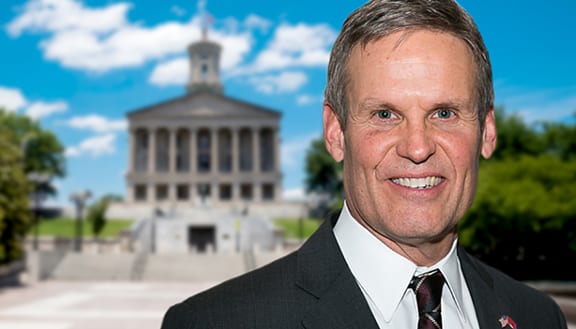Governor Lee gave his second “state of the state” speech to both houses of the legislature on Monday, February 3.
As expected it included more money for education and distressed rural communities. It also included $250 million for mental health services for K-12 students and $230 million for improvements at state colleges and universities.
Lee outlined a number of initiatives to improve literacy in the early grades that stresses phonics-based reading instruction. Lee plans to spend $70 million for better teacher training, salary increases, and interventions and support for children before they reach the 3rd grade.
“Right now, our biggest academic challenge for our students is literacy. Currently, only one-third of our third graders are reading on grade level,” Lee said.
The Democratic response was less than lukewarm.
“For many issues, Tennessee needs far more than the incremental steps that the governor put forward tonight,” said Sen. Jeff Yarbro.

Yarbro said Tennessee is ranked 45th in per-pupil funding and Lee’s initiatives probably won’t change that. State education dollars are distributed each year according to a funding formula, the Basic Education Program (BEP). He said Lee’s programs will not eliminate the “structural deficit” in public education which force local communities to raise most of the money to run their schools.
Yarbro pledged Democratic support for Lee’s health initiatives. But he said Lee could do something else to address the opioid crisis, get more Tennesseans health insurance, and provide more education funding.
“The governor announced $300 million to shore up TennCare, mental health and substance abuse treatment and the health safety net. But that’s $300 million dollars that could have gone to education if we had just expanded Medicaid,” Yarbro said.
Tennessee is one of 16 states that rejected the 2014 Medicaid expansion.
Lee’s economic programs include cutting the professional privilege tax by 50%, sending $100 million to cities and counties, and giving incentives to companies to locate in one of Tennessee’s 39 poorer counties.
“The economy that’s led to fortunes for some is still leaving too many behind. Many families are just one flat tire, one accident, or one illness away from a financial crisis,” Yarbro said.
He said the economy is great for big developers and the wealthy who invest in the stock market. “But that’s not the reality for most of us,” Yarbro said.
Lee’s criminal justice plans have carrots and sticks.
“Last year, we cracked down on fentanyl traffickers, and this year I propose increasing the criminal penalties associated with theft of a firearm and increasing the criminal penalties associated with reckless endangerment of a police officer or first responder,” Lee said.
The Governor noted that 95% of convicts eventually leave prison. “It’s in the best interest of your family and community that those individuals be prepared to make that reentry successfully, instead of returning to a life of crime.”
Tennessee’s recidivism rate is 46%. Within three years almost half of Tennessee inmates wind up back in prison. The national average is 68%, according to the Bureau of Justice Statistics.
Lee talked about 23 recommendations from a December 2019 report by the Tennessee Criminal Justice Investment Task Force. He proposed changes to parole and probation that include special supervision for people with addiction and more community supervision when inmates get out.
Lee spent $2 million last year on the Recovery Court System. He wants to spend $6 million more. The Governor invested $10.5 million in inmate educational programs and wants to increase it by $5 million. He plans to revise the occupational licensing process and encourage employers to hire the former inmates.
“The biggest unanswered question tonight has to do with the governor’s criminal justice reform package,” said Yarbro. He said it is unclear which of the 23 task force recommendations will be implemented.
“Tennessee is moving in the wrong direction on criminal justice. The cost of running our prisons have exploded to over $1.1 billion, but we still have the fourth highest violent crime rate in the country.”
He said Tennessee should be on a par with other states and Tennesseans deserve more than they are getting from the Governor.
“We ought to at least be able to keep up with Kentucky when it comes to health insurance. We ought to be able to do as well as Arkansas when it comes to providing child care. We should be able to keep up with Texas on criminal justice reform. And we ought to be able to keep up with Alabama on education funding. That’s not asking too much,” Yarbro said.


